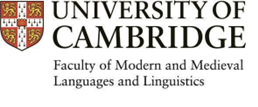| 3 Jul 2023 - 4 Jul 2023 | All day | Room SG1, Alison Richard Building, 7 West Road, Cambridge | |
- Description
- Programme
- Speaker biographies
Description
Convenors
- Isaias Fanlo (University of Cambridge)
- Javier Perez Osorio (University of Cambridge)
Keynotes
Please note that the keynote lectures will be given in English
- Juana María Rodríguez, Professor in Comparative Ethnic Studies (University of California Berkeley)
- Paul Julian Smith, Distinguished Professor in Latin American, Iberian and Latino Cultures (CUNY)
Summary
Please note that the panel discussions will be given in Spanish
Queerness is, among many other things, change; therefore, a queer gaze needs to be aware of mutations and deviations. In their fundamental essay ‘What’s Queer about Queer Studies Now?’ (2005), David L. Eng, Jack Halberstam and José Esteban Muñoz asked themselves a critical question: given all the achievements and the preponderance of identity politics in social, political, and academic discourses, what are the new paths Queer Theories should embrace? “The contemporary mainstreaming of gay and lesbian identity —as a mass-mediated consumer lifestyle and embattled legal category— demands a renewed queer studies ever vigilant to the fact that sexuality is intersectional, not extraneous to other modes of different”, the authors claim (1).
Queer Hispanists have hitherto explored the state of the issue and the new divergences of the discipline, in volumes like ¿Entiendes? Queer Readings, Hispanic Writings (1995), Hispanisms and Homosexualities (1998), and Queer Iberia. Sexualities, Cultures, and Crossings from the Middle Ages to the Renaissance (1999). But what happens to Queer Hispanisms Now? Have Queer Studies in the field of Hispanism transcended the initial emphasis on the sociocultural outpouring of desire and sexuality and its radical potential? How can a queer gaze articulate crossings and intersections between the different territories and cultures included within the field (Peninsular Spanish, Catalan, Basque, Spanish Latin America, Portugal, Brazil, Native Cultures)?
The panels at this conference will be organised around critical debates currently taking place in the field of Queer Studies. The panellists will be invited to contribute to those debates by exploring the intersections between queerness and Hispanism.
It is time to think about Queer Hispanisms Now.
Keynote lectures
Supported by:



![]()
![]()
![]()
![]()
Programme
| Monday 3 July 2023 | |
| 9:00 - 9:45 | Registration and welcome remarks |
| 9:45 - 11:15 | Race, class, disability
|
| 11:15 - 12:45 | Homonationalism, migration, diaspora
|
| 12:45 - 14:00 | Lunch |
| 14:00 - 15:30 | Time, space, memory and archive
|
| 15:45 | Keynote presentation Paul Julian Smith (Distinguished Professor in Latin American, Iberian and Latino Cultures (CUNY)), Professor at the University of Cambridge between 1991 and 2010. ‘Queer Mexicans in Madrid: Ozores and Almodóvar, Camus and Caro’ |
| 18:00 | Performance I Des-espera (Les Impuixibles) I Fitzwilliam College Auditorium Synopsis: About the show: |
| Tuesday 4 July 2023 | |
| 9:30 - 11:00 | Queer failures
|
| 11:15 - 12:45 | Gender and its discontents
|
| 13:00 - 14:30 | Lunch |
| 14:30 - 16:00 | Sex and sexualities
|
| 16:30 | Keynote Presentation Juana María Rodríguez (Professor in Comparative Ethnic Studies, University of California Berkeley) ‘Specters of a Puta Life’ |
Speaker biographies
Paul Julian Smith
Paul Julian Smith is an internationally recognized critic in Hispanic cultural studies and critical theory. He has been Visiting Professor in 10 universities including Stanford, NYU and Carlos III, Madrid and has given over 100 lectures and invited papers around the world. His books have been translated into Spanish, Chinese, and Turkish. Elected a fellow of the British Academy in 2008, his interests are wide-ranging and interdisciplinary. His Writing in the Margin (Oxford University Press, 1988) was the first systematic application of poststructuralist critical theory to literature of the Spanish Golden Age, and The Moderns: Time, Space, and Subjectivity in Contemporary Spanish Culture (Oxford University Press, 2000) was a ground-breaking examination of Spanish urban space. As the Spanish film critic for the British Film Institute’s Sight and Sound magazine, Smith wrote dozens of reviews and, as the author of Desire Unlimited: The Cinema of Pedro Almodóvar (Verso, 1994, 2000 and 2014), earned a reputation as the major world scholar on the films of the Spanish director. Smith went beyond the field of cinema in Contemporary Spanish Culture: TV, Fashion, Art, and Film (Polity, 2003) to examine cultural areas that receive less academic attention; and his 2007 work Spanish Visual Culture: Cinema, Television, Internet (Manchester University Press) explores emotion, location, and nostalgia in each of these media. Smith’s research also focuses on Mexico, including a book on the film Amores Perros (BFI, 2003). He was a juror at the Morelia Film Festival in Mexico in 2009 and at the San Sebastián International Film Festival in 2013, was a regular contributor to Film Quarterly, and is one of the founding editors of the Journal of Spanish Cultural Studies.
Juana María Rodríguez
Juana María Rodríguez is a cultural critic, public speaker, and award-winning author who writes about sexual cultures, racial politics, and the many tangled expressions of Latina identity. A Professor of Ethnic Studies; Gender and Women’s Studies, and Performance Studies at UC Berkeley, she is the author of the newly published Puta Life: Seeing Latinas, Working Sex (Duke UP 2023); Sexual Futures, Queer Gestures, and Other Latina Longings (NYU Press 2014) which won the Alan Bray Memorial Book Prize at the Modern Language Association and was a Lambda Literary Foundation Finalist for LGBT Studies; and Queer Latinidad: Identity Practices, Discursive Spaces (NYU Press, 2003). She also served as a co-editor of the special issue of TSQ: Transgender Studies Quarterly on “Trans Studies en las Americas.” Her work has been translated into Spanish, Portuguese, German, and Greek. In 2023, Dr. Rodríguez was honored by The Center for Gay and Lesbian Studies’ with the prestigious Kessler Award, in recognition of her significant lifelong contributions to the field of LGBT Studies.



